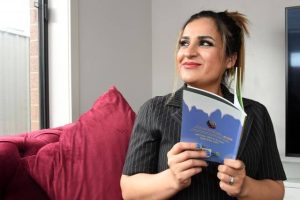Heartlands prize winner finds inspiration in lived experience
The first prize winner in this year’s Heartlands art project says her experiences as a refugee and her family’s difficult history inspired her to become a writer.
Wida Tausif is an Afghan refugee who grew up in Pakistan and New Zealand.
Her family fled their homeland when the Mujahedeen took control of the Afghanistan in 1992. Her mother and four siblings fled to Pakistan on foot and her father followed a year later.
 The family settled in New Zealand in 2001 but after the Christchurch earthquake decided to come to Australia.
The family settled in New Zealand in 2001 but after the Christchurch earthquake decided to come to Australia.
“My own experiences and my family history inspired me to start writing,” Wida said.
“During my time at high school years in new Zealand, I was subjected to racism and discrimination.
“They were bad times. People would call me a terrorist because I looked different.
“But at the same time I was asked to write a poem at school and I found it was a way of expressing what I was feeling.
“At that point I decided I wanted to write,” she said.
Wida had her first book of poems published in 2015, titled ‘Don’t Give Up on Your Dreams’.
Her second effort was a children’s book called ‘Aliens do Not Belong on Earth’ and a third book, another children’s offering called ‘Ali Goes to School’, is due out next year.
Wida works as a Kindergarten educator and is studying to become a school teacher. She was recently a finalist in the Victorian Educator of the Year Award.
She says her family’s history and her culture inspire her to write.
“When Afghanistan was plunged into war, it was a horrible time for my parents. My mum had five young kids to look after and times were difficult. But my family prevailed and their resilience saw them through,” Wida said.
“At that time living in place like Australia or New Zealand was a dream, but a dream that came true.”
Wida’s winning heartland entry is a poem titled ‘Threads of Belonging: A Tapestry of Refuge and Resilience’, which sums up her family’s journey.
Her verses include:
‘In the heart of turmoil, where chaos holds sway,
A saga of drifting souls, their destinies in play.
Through shattered hopes and homes, they flee,
From distant lands, in search of sanctuary.
Homeland’s memory, carried on a breeze,
Fading as conflict’s flames dance and tease.
On foreign shores, their footsteps trace,
Leaving behind a world, a familiar place
Their voices rise in harmony, a chorus of hope,
In their stories, a reminder of our shared scope.
Belonging transcends boundaries, it knows no bounds,
In their pursuit of a home, a sense of peace surrounds.
So let us stand with them, hand in hand,
United in purpose, together we’ll withstand.
For in their search for belonging, they reflect our own,
A tapestry of humanity, a story yet unknown’
The 2023 Heartlands Art Project has collected a haunting array of written works by refugees exploring the themes of ‘homeland’ and ‘belonging’.
The collection of works, published by migrant and refugee settlement agency AMES Australia, provides a glimpse into the experiences, hopes, dreams and passions of the millions of humans displaced by conflict.
Aspiring writers from a broad spectrum of refugee communities have produced poems, prose, song lyrics and spoken word pieces for this year’s Heartlands. Hailing from countries including Afghanistan, Syria, Iran, Nepal, Ukraine, Venezuela and Ethiopia, the writers’ work gives insights into the refugee journey and highlights our common humanity.
Now in its 11th year, Heartlands offers the opportunity for refugees and migrants tell their own stories through various forms of art.
One of the project’s aims is to give newly arrived migrants and refugees the opportunity to tell the authentic stories that reflect their experiences, challenges, achievements and aspirations
“Much of what we see in the media about refugees, migrants and emerging communities is portrayed through the prism of mainstream society. Heartlands 2023 has offered the opportunity for culturally and linguistically diverse youth to tell their own authentic stories using accessible digital tools,” said AMES Australia CEO Cath Scarth.
“This year we are witnessing the largest displacement crisis in global history with more than 110 million people forced to flee their homes. And we are seeing an escalation in conflicts across the across the world, notable in places like Ukraine, Sudan and in Israel and Gaza,” Ms Scarth said.
“In a global landscape of conflict and displacement, it’s important to understand the journeys refugees and migrants make and the reasons they make them – and also to acknowledge the contributions they have made to this country and continue to make.
“The aim of the project is to transcend cultural barriers to reveal the hopes, dreams, challenges and everyday lives of people who make up our refugee communities,” she said.












